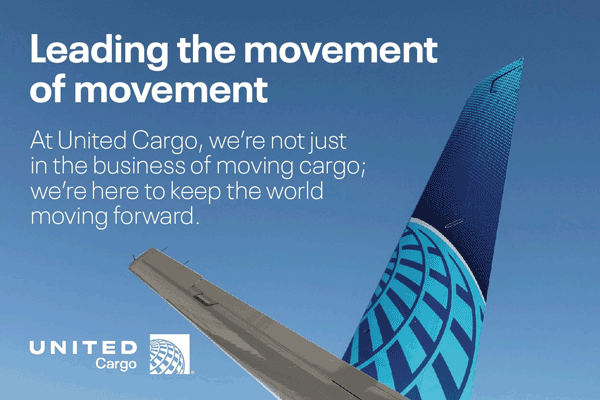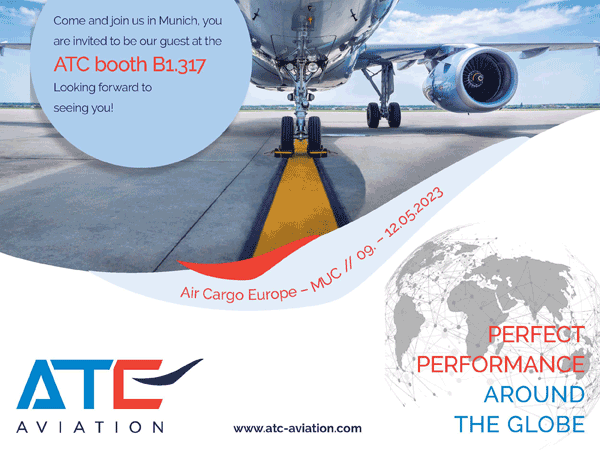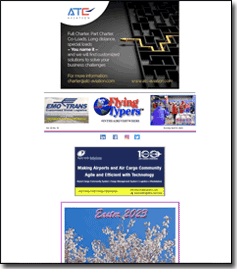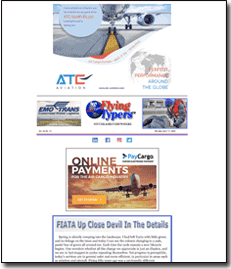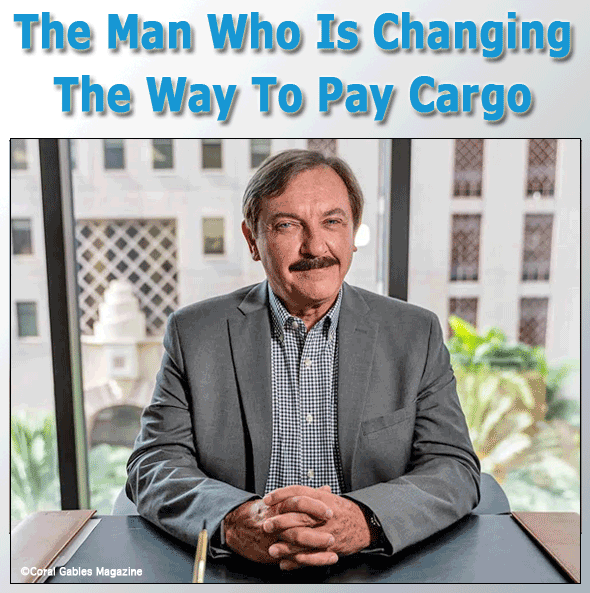 |
This is the first article that the FlyingTypers
is publishing to debate an issue that has been on the tables of trade
and logistics experts for decades by now, yet without anyone in a position
to finally indicate the word END. Digitization in freight logistics is
a reality, a “world changer” as our guest Eduardo del Riego
defines it, but in a way it is an unaccomplished reality. When it comes
to payments, we are still in a sort of limbo and nobody seems to be perfectly
happy about the situation. There is light at the end of the tunnel though
and we shall see with our guest, this light is pretty bright.
There is no ambition from our side to present
or promote any solutions in particular, but we shall talk to those who
are willing to share their views and this may come as a small contribution
to the modernization of our sector, that we all have at heart. We shall
start with the well-known professional, whom we have had the pleasure
to meet on repeated occasions, Eduardo del Riego, who by the way, received
the 35th Anniversary Ellis Island Medal of Honor at Ellis Island on May
14th, 2022 in New York City. He was only 6, when Inger Bagger Stovall
and her husband accepted him together with his brother Enrique Del Riego
to join her family via the ''Pedro Pan'' program from Cuba in 1962.
Robert Henry Stovall, his adoptive father,
began on Wall Street as a messenger for Reynolds & Co., during summer
vacations in the early 1940s where his father was an executive. Robert
joined E. F. Hutton and Co. in 1953 as a junior analyst, working his way
up to Partner for Research in 1961. Later he was Research Director of
Nuveen Corporation before rejoining Reynolds as a Partner in Marketing
and Research. After 16 years with Dean Witter Reynolds, he became President
of Stovall Twenty First Advisers, Inc., before moving to Prudential Financial
and Wood Asset Management in Sarasota, Florida. Mr. Stovall was also well
known as a panelist on the PBS television show: "Wall Street Week
with Louis Rukeyser", where he was one of Louis' analytical "elves"
and was elected to that program's Hall of Fame. He was a frequent commentator
on financial TV and radio, and as a regular columnist for such publications
as Forbes and Financial World.
In his turn, Eduardo Del Riego began his
career in the freight industry in 1974. By age 21, he’d already
run a division for a ship line.
In 1999, after successfully launching and
managing a series of freight companies, including building a U.S. logistics
company with over $100 million in revenue, Mr. Del Riego transitioned
into the software business founding Athena Information Systems.
After the sale of Athena, Eduardo headed
Active Freight as President growing the company seven-fold prior to becoming
PayCargo President and Chief Executive Officer (CEO) in June 2013. In
this period Eduardo matured a few concepts in the area of logistics business
transactions that were crucial in his subsequent moves, and may have influenced
the sector much farther than one could be led to believe at first glance.
PayCargo was launched in 2007 by a group
of South Florida shipping executives, who saw the need to modernize freight
payments. By 2019, the venture had developed its business model and grown
substantially, processing a record $2 billion in payments that year. Business
then doubled each year to $4 billion in payments processed in 2020 and
$10 billion in 2021.
“Once you’ve secured a payer,
the challenge is working with them to onboard all of their vendor networks.
Of course, they all pay the major ship lines, major airlines and major
rail lines. That can range from a small package shipped by FedEx or UPS
to single container-loads or multiple container-loads of cargo. It’s
everything from electronics to food. But you’d be surprised how
many different warehouses, trucking companies, messenger services, etcetera
that each of them uses, and it’s kind of unique to each location,”
says del Riego. “The DHL office in Dallas, for example, uses a different
network of vendors than the one in Houston.”
Paper payments for freight? Not if you’re
a customer of PayCargo, this is Eduardo’s motto.
PayCargo offers an online platform that
lets shippers pay electronically, speeding up the payments and reducing
the time for cargo to be released from seaports, airports, and other facilities.
The platform also provides easy-to-use electronic data not available when
paying for freight through traditional means such as vouchers, checks,
or cash. We all know that modern logistics is made of millions, billions
of small individual transactions, all nested to reduce the space between
the shipper and consignee to zero, despite the explosion of the number.
Each little bit has financial significance and can escalate into exorbitant
costs if no effective solution is offered. That is the space where PayCargo
comes in.
Today, PayCargo serves more than 40,000
customers, including heavyweights such as DHL, UPS, and Kuehne & Nagel.
They pay some 5,000 vendors from shipping lines to airlines, train operators
to warehouses.
PayCargo’s business has soared recently,
partly because of overseas expansion. It first grew across Europe and
earlier this year opened in the Middle East in Dubai (United Arab Emirates)
and in Asia in Hong Kong and Taiwan. Adding to revenue, freight rates
had risen sharply due to COVID-19 up-ending supply chains and crimping
the availability of metal shipping containers and other supplies.
PayCargo charges a fee for each payment
it processes, currently about $6 to $12.50 per transaction. In 2021, its
revenue topped $40 million, and for 2023, it expects to reach at least
$100 million. In June last year, PayCargo secured $130 million in investment
from Blackstone Growth, part of the behemoth global investment firm Blackstone.
That infusion – coming on top of $160 million raised in 2020 and
2021 from Insight Partners – is accelerating overseas expansion
beyond Europe and the Middle East. PayCargo is now setting up offices
in Japan, Vietnam, Australia, and New Zealand, and it plans to open in
Chile, Panama, and Mexico in 2023. Eduardo Del Riego says: “By the
end of 2024, we hope to be on both coasts of Latin America – east
and west – and in the Caribbean.”
So, let us delve into our Q & A with
Eduardo del Riego and see where we get.
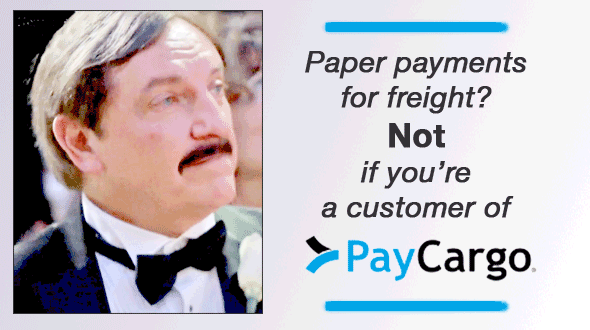 |
FT: Eduardo,
you were born in Habana, Cuba and raised in Mt. Lakes, New Jersey, many
years ago, so your business background is 100% American.
EdR: Yes,
quite, Geoffrey, you know that PayCargo is not my first rodeo . . . NJ
was the start but then Florida and California were equally important for
me and that is where the degree was earned. Miami-Dade Community College,
California Coast University and mainly FIU contributed to my education.
At age 21 I was given the opportunity to
run a (small division) for Crowley Maritime. I moved to Jacksonville,
Florida and to this day still have friends in The Dominican Republic and
Haiti, who helped mentor me along the way . . . Then
it was Sea-Land, before going into business for myself in a partnership
called Southern Steam representing ship lines. This was sold to Inchcape.
Then a partnership with a Brazilian group to build ship line, agency,
cargo airline, and three technology companies in the logistics space.
So I would say you are right, this is an all-American education and business
background.
FT: Was
aviation finance your choice as a profession?
EdR: Not
really. Although my degree is in international finance, Aviation was one
of the cargo companies we built in the 1990’s with my Brazilian
partners. This was my first experience in the challenging world of air
cargo. I am still involved in a maritime port in Brazil, but I have been
out of all logistics for over fifteen years.
FT: Do
you consider what you are doing a job or a profession?
EdR: I am a serial
entrepreneur, thus I consider what I do not a profession, but a passion.
FT: Who
were your mentors? And what did you learn from them?
EdR: I started
in logistics at age 18 out of high school as I went to college at night.
Thus I have so many it would be impossible to mention them all, but one
stands out though: RD Nick Carter for giving me a chance at age 21 to
run a division of a ship line . . . There have been many others and I
would love to have the time to mention each of them. I always felt my
dad and foster dad were my best friends and good role models . . . and
missed much.
FT: Was
starting a financial IT company a challenge?
EdR: The
main challenge was finding the right partners to build the software and
run the financial operations. We were fortunate to partner early with
First Data. Then like all businesses you need to show the advantages of
your solution. It was not too difficult to sell replacing checks with
ACH, with all the data needed to move cargo.
FT: Have
you found any noticeable difference between U.S. customers and non-U.S.
customers?
EdR: Credit
in Europe and other parts of the world changes the dynamics, but in the
end you are solving data flow issues and making transactions error free.
This is key everywhere, whether the mode is air or ocean or rail cargo
. . .
FT: How
has technology brought a change in customer habits?
EdR: You
can write a book on this . . . it has revolutionized everything we do,
i.e. payments, cargo bookings, tracing, etc. You look at what Amazon does
to show you when your order is arriving, and others have built this for
cargo as well. We are happy to provide the payment invoicing and soon
scheduling solutions to make this Eco-chain more efficient.
FT: Is
PayCargo conditioned to provide "custom-tailored" services?
EdR: Absolutely
that is exactly what we do. We customize the experience, for payers as
well as for vendors. It is as unique to American Airlines, as it is to
Kuehne & Nagel, unique in that it solves their needs and those of
their clients. The major challenge is outlining how we can customize what
you use PayCargo for in the U.S. and Canada to fit your needs in UK, Europe,
Dubai, Hong Kong, anywhere in the world. This is a process that requires
close collaboration with your clients—the airline or logistic company,
to ensure we meet their expectations and ‘solve their challenge.’
I guess one could say this is the epitome of tailor-made services.
FT: How
does the immediate business future look to you? Do you see any potential
dangers facing the industry?
EdR: We must
learn from COVID years and put to good use the experience. We should focus
more on technology. We cannot wait for tomorrow to become fully digitalized.
2023 will be a challenge for the entire logistics supply chain. We will
be faced with tighter margins, need for more efficiencies, and a work
force pressed between push for higher wages to meet inflation and lower
revenues to pay for them. Then add to the recipe, a more than likely global
recession. But I am an optimist, we shall overcome and 2024 will be better
and 2025 better still . .
FT: On
a global basis, are certain regions more advanced in embracing digital
payment processing than others?
EdR: Clearly
the more developed countries will do better, but we expect growth in all
areas. Of course, doing business globally presents diverse challenges.
For example, to start an office some countries
require more paperwork than others, while other administrations move more
quickly. Setting up in Dubai and the United Kingdom went “relatively
fast,” but it took longer in Hong Kong, Taiwan, and Vietnam. Operations
also differ.
There tends to be more credit offered in
Europe than in the rest of the world. Companies in Europe often get 30
to 180 days to pay for freight shipments, whereas importers in the U.S.
typically get no credit and U.S. exporters tend to offer 15 to 30 days.
In Europe, it’s part of the sales
presentation for freight to include credit. For these reasons growth is
expected, but it is not going to be even in all scenarios. For PayCargo,
we’re forecasting to grow about 50 percent this year. That’s
still pretty impressive, if you consider that global trade – if
it grows at all – is expected to rise only by 1 percent. The strong
growth should boost PayCargo’s global employment to top 300 at year-end,
including some 50 at our Coral Gables headquarters adjacent to Miami and
25 at a tech hub in Downtown Miami. Hiring is easier now that the tech
boom has increased the number of programmers locally. We also have a partnership
with Florida International University, which helps us to get programmers,
developers, and logistics specialists. In the end employment is what matters.
FT: I
think we shall have a closer look at your involvement with FIU in the
near future, if you allow me, but I need to extract a bit more from your
knowledge base, if I may, Eduardo . . . Post pandemic, the logistics industry
has gained more attention but is it a better one?
EdR: In general,
I would say yes. We have become more efficient, relying more on technology.
That said we must continue this process and not take a step back. Modernizing
freight payments fast remains PayCargo’s focus. The company now
is forging partnerships with key freight-service groups to speed growth.
FT: Please
let me go back to the earlier part of your life, you have a personal background
that could have been written by a novelist. I cannot resist asking you
questions. We did some research and your adoptive mother and father Robert
and Inger came up . . . Can you tell us more about how this shaped you?
EdR: You
know my adoptive father was a very special person, he passed away two
years ago, sadly it was during COVID: all we could do was have zoom calls
with him. At age 17, my foster father enlisted in in the army, because
of World War II, after the bombing of Pearl Harbor . . . so that tells
you the kind of person he was. He met his wife Inger in Denmark when he
was studying there. She was very proud of her Danish roots and her Danish
traditions. Her father wouldn't talk to her for 10 years for marrying
this “savage from America.” Would you believe that, someone
who was a graduate of NYU and Wharton Business School was not considered
good enough, but those were different times and a different Denmark .
. .
FT: I'm
wondering how old were you when you were adopted as part of the peter
pan initiative. I remember watching your father on Wall Street Week with
Louis Rukeyser. He also worked for EF Hutton, who had that brilliant ad
campaign that said, “when EF Hutton speaks, everybody listens.”
I suppose when Mr. Stovall spoke, you listened.
EdR: I was
six and yes, I was clearly influenced by him. He was always in the top
2 or 3 financial people that predicted the market correctly. I regard
my father Enrique V. Del Riego and foster dad as my main mentors in life.
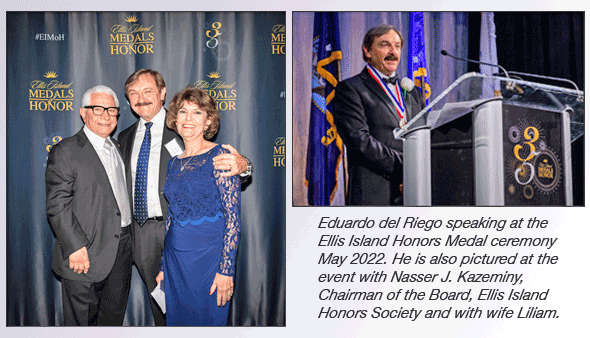 |
FT: I
discovered you want you won an award at Ellis Island, can you elaborate?
EdR: It's
called the Ellis Island Honor Society medal, it was created by President
Ronald Reagan to honor immigrants who have been successful and given back
and you know I was very humbled by that. It’s one of the things
I cherish the most. In 2022 when I received the award I was also blessed
that Chairman Kazeminy and the board asked me to join the board so I'm
now on the board of the Ellis Island Honor Society. It was really beautiful,
you know, I had the privilege of sitting at a table with two generals,
an admiral and Charlie Rangel, the senior congressman from the state of
New York, now retired.
FT: Well,
we shall surely come back on this once more this year and perhaps ask
you to share a bit more of your time with us, but I need to ask you another
question right now that I am sure will interest our readers. What would
you want your legacy to be and how would you like to see it brought forward?
EdR: Business
has been huge in my life, maybe even too big. That said, you want to be
remembered as a businessman, but even more so as a good son, husband,
and father (also as extended father to my 16 nephews, who are all important
in my life). Then the key is always giving back. In particular, to our
great country . . . and the fact is it is one of the few places you can
start with nothing and build several successful businesses and transform
your life, as well as those of many others. From some points of view,
in PayCargo we strive to transform an industry.
FT: I
was looking over your life and the things you've done, how you came in
and changed cargo forever. You came in and did something so unique. It's
just amazing of the 14,000 kids that came in 1962 from Cuba. I’m
wondering what has happened between PayCargo and the market that you tried
to get with FIATA, is that showing any signs of life?
EdR: This
arrangement was put together by Lionel van der Walt and then I think when
Lionel left, it didn't have someone to lead it. I think we have someone
now that's spearheading it, but it needs a lot of attention and it needs
a collaborative effort from FIATA, a commitment similar to the kind we
receive from our other partners. For example, Air France, which came in
and basically said: “OK, this is the way we want to be paid and
in North America we're going to get rid of our collections department.
It's going to go through PayCargo, period.” I'm
not saying we need that from FIATA, but we need a commitment from them
to say: “yes, this is the way we want our partners to pay each other
and then to use it to the next level to pay their vendors.”
As I said, It's not all FIATA, it's been
the lack of having someone from our side to spearhead the effort, I think
we have that person now. We've given it to Adrie Reinders and he's spearheading
it. He's based in Amsterdam, but he travels all over and this is his project
now to take it to the next level. What he needs is a matching counterpart
in FIATA.
FT: Thank
you, Eduardo. We are delighted you were able to spare some time for us
and our readers. Please do promise to call again and have another chat
with us in the near future, we have a number of questions and we are sure
your answers can be pretty original.
GDA |
